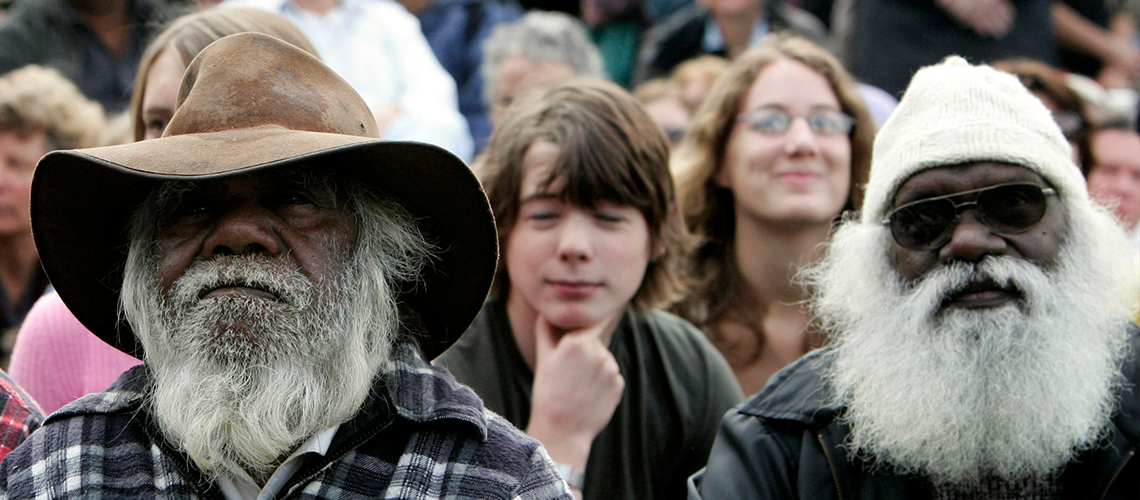Indigenous rights: Australian referendum offers opportunity to fulfil international human rights law
Ann Louise Deslandes Tuesday 25 July 2023

Australia will vote in a referendum later in 2023 on a proposal to recognise Aboriginal and Torres Strait Islander people in the Australian Constitution by establishing an independent parliamentary consultative mechanism, called ‘the Voice’.
The Voice was a key recommendation of Uluru Statement from the Heart, delivered by First Nations groups at the First Nations National Constitutional Convention in Australia’s Northern Territory in 2017. The Statement also calls for a national truth commission on the legacies of the colonisation of Aboriginal and Torres Strait Islander people that began in 1788 and the establishment of a treaty between First Nations peoples and the Australian government.
Legislation to establish a referendum on an Aboriginal and Torres Strait Islander Voice to Parliament passed the Australian Senate in June. Australian citizens, for whom voting is mandatory, will answer ‘yes’ or ‘no’ to ‘[altering] the Constitution to recognise the First Peoples of Australia by establishing an Aboriginal and Torres Strait Islander Voice’.
A First Nations Referendum Working Group advising the Australian government has established several ‘design principles’ for the mechanism, including that it will give independent advice to the Parliament and government; be comprised of Aboriginal and Torres Strait Islander people based on the wishes of local communities; be representative of Aboriginal and Torres Strait Islander communities, gender-balanced and include youth; and that it will not have a veto power over legislation and policy.
Proponents of the Voice highlight that a successful referendum will begin to bring Australia, which came into being as a colony of the British crown in 1788, into line with comparable settler colonies around the world. Canada, New Zealand and the US, for example, all recognise their First Nations people in their national constitutions and have participatory mechanisms in parliament.
The design of the Voice to Parliament formalises that group of people to recognise the wrongs of the past and to ameliorate those problems going forward
Mark Stephens CBE
Co-Chair, IBA’s Human Rights Institute
Aboriginal and Torres Strait Islander people suffered invasion and genocide at the hands of British colonisers at the founding of the Australian nation, and the effects of colonisation continue to be evident in critical indicators of social health and wellbeing. In the words of the Uluru Statement, First Nations people in Australia are ‘the most incarcerated people in the world’, children are ‘aliened from their families at unprecedented rates’, and young people ‘languish in detention in obscene numbers’.
‘A Voice to Parliament will help to close the gap’ between the life chances of Indigenous and non-Indigenous people in Australia, Minister for Indigenous Australians Linda Burney told media in July. This, she said, is ‘because we know that listening to communities leads to better outcomes that improve people’s lives’.
Dr Hannah McGlade, a Noongar academic and lawyer, says that a successful ‘yes’ vote at the upcoming referendum would strengthen Australia’s compliance with international human rights law and policy such as the International Covenant on Civil and Political Rights and the UN Declaration on the Rights of Indigenous Peoples. ‘National Aboriginal bodies are very important in holding Australia to account around human rights violations at the international level’, says McGlade, who’s an expert member of the UN Permanent Forum on Indigenous Issues.
A national body needs constitutional protection, because, historically, such bodies ‘get formed in one government’s term and then get taken down by the next one. We’ve had seven of them’, she explains.
Mark Stephens CBE, Co-Chair of the IBA’s Human Rights Institute (IBAHRI) and a partner at Howard Kennedy in London, says the IBAHRI welcomes the Voice to Parliament proposal in Australia. The Voice has been designed ‘against a framework of serious wrongs of the past and a legacy of laws which have been discriminatory’, he says. It’s important to have ongoing legislation and past legislation reviewed with a critical eye, therefore. For Stephens, the design of the Voice ‘formalises that group of people to recognise the wrongs of the past and to ameliorate those problems going forward’, representing a ‘statutory consultative view’ on future Australian law and policy.
The vote in Australia comes as Indigenous rights are under the global spotlight in Brazil, where the lower house of Congress voted in June to restrict the legal recognition of Indigenous territories throughout the country. Bill 490, which is intended to make more Indigenous land available for economic development, now awaits debate and a vote in the Senate.
It’s very common, says Stephens, for Indigenous peoples throughout the world to be disenfranchised from the democratic process in various ways. In Australia, the Voice to Parliament would ‘entrench’ Indigenous belonging to decision-making power.
McGlade says she has been inspired by the successes of Indigenous peoples in other parts of the world in achieving recognition and consultation within former colonial states, such as the Sámi parliaments of Finland, Norway and Sweden and the use of the Constitutional Court in Colombia in recognising the right of Indigenous people to self-determination.
The referendum on the Aboriginal and Torres Strait Islander Voice to Parliament in Australia requires a double majority – a majority of electors at both the state and national level voting ‘yes’ – to succeed. Current polling suggests there’s a growing number of ‘no’ voters, with some detractors to a Voice to Parliament expressing concern that it will give Aboriginal and Torres Strait Islander people disproportionate power in national decision-making, and others claiming it won’t provide them with sufficient substantive power.
Image credit: Aboriginal men watch Prime Minister Kevin Rudd apologise to Aboriginal Australians for their historic mistreatment on a big screen outside Parliament House in Canberra, Australian Capital Territory, Australia, 13 February 2008. REUTERS/Mick Tsikas
